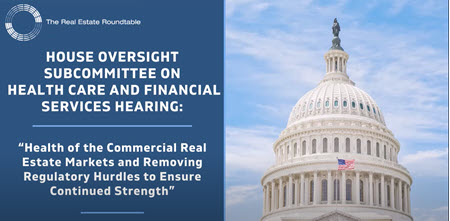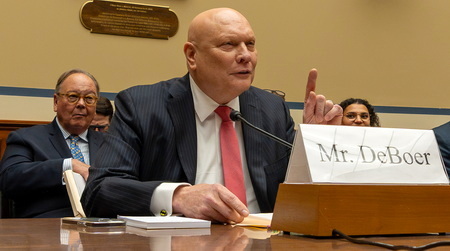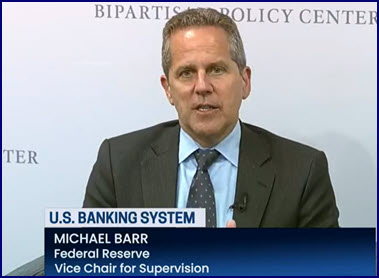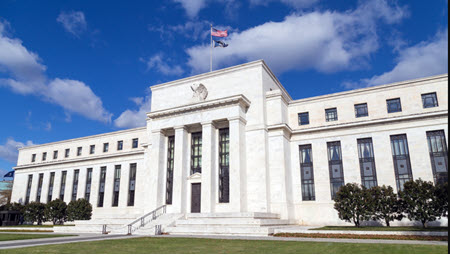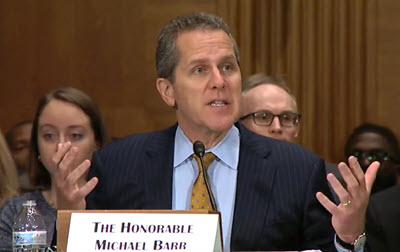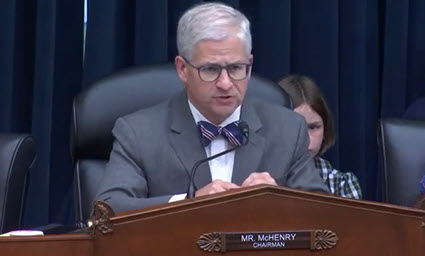Roundtable President and CEO Jeffrey DeBoer testified this week before a House subcommittee on the “Health of the Commercial Real Estate Markets and Removing Regulatory Hurdles to Ensure Continued Strength.” (Videos of DeBoer’s testimony | Entire hearing | Select clips from the subcommittee’s wrap-up)
CRE Issues
- The April 30 hearing before the House Oversight and Accountability Subcommittee on Health Care and Financial Services included The Roundtable’s views on market liquidity, the state of the office sector, remote work, affordable housing, and property conversions. (DeBoer’s oral statement and written testimony)
- DeBoer emphasized that all stakeholders in the regulatory and private sectors should work together to ensure real estate continues to be a leading driver of the economy—and a primary way cities grow, business needs are met, and housing challenges are solved. (Transcript of entire hearing)
- DeBoer also clarified, “The commercial real estate industry is not seeking a bailout of any sort.” (MarketWatch, April 30)
- Subcommittee members heard testimony on how liquidity in CRE markets, particularly office, is an overriding industry concern. As nearly half the value of the $4.7 trillion property debt market is scheduled to mature by 2027, base interest rates have risen nearly 500 basis points in 24 months while lenders are considering reductions in their CRE portfolios. (RER’s written testimony and Mortgage Bankers Association testimony)
- DeBoer urged policymakers and regulators to acknowledge that not all CRE is the same. “In the office market, there are notable differences. Some individual owners are facing considerable pressure, potentially leading to increases in mortgage defaults, foreclosures and large losses of equity. Many top-tier modern office buildings with strong ownership and workspace amenities are currently weathering the storm. There needs to be a better distinction and not a monolithic treatment of commercial real estate.”
- DeBoer added that pressures within certain segments of the office sector are creating a “slow-moving train wreck.” (Watch select video clips of DeBoer’s comments)
Policy Solutions
- The Roundtable’s policy recommendations submitted to the subcommittee address a wide swath of concerns for owners, lenders, and local communities, including:
- Ensure federal employees return to the workplace. DeBoer testified, “The federal government should lead by example by highlighting the value of in-office work” as it is critical for the health of cities, local economies, tax bases, and small businesses. (GlobeSt, May 2)
He also commended efforts by House Oversight Committee Chairman James Comer (R-KY) to bring federal workers back as the lead sponsor of the Stopping Home Office Work’s Unproductive Problems (SHOW UP) Act (H.R. 139). “This bill passed the House over a year ago and should be enacted into law,” Deboer said. (Roundtable Weekly, Oct. 20 and Feb. 3, 2023)
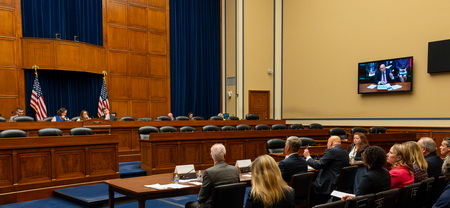
- Encourage banks and loan servicers to extend maturing loans and restructure maturing loans with new equity—effectively making “cash-in refinances”—by converting non-performing and criticized loans to new performing loans.
- Encourage foreign capital investment in U.S. real estate by amending or repealing the outdated Foreign Investment in Real Property Tax Act (FIRPTA).
- Reject pro-cyclical measures such as the Basel III Endgame and other regulatory measures that will restrict credit and capital formation.
- Stimulate the production of affordable housing. The Roundtable and a broad real estate coalition submitted a set of specific policy recommendations this week to Congress detailing a host of pending legislative and regulatory actions that would help provide housing to more Americans.
- DeBoer informed the subcommittee that these solutions include converting obsolete buildings into housing, increasing the Low Income Housing Tax Credit volume caps, incentivizing local zoning and permitting reforms, increasing efficiency in the Section 8 housing voucher program, and more. (see Affordable Housing story below)
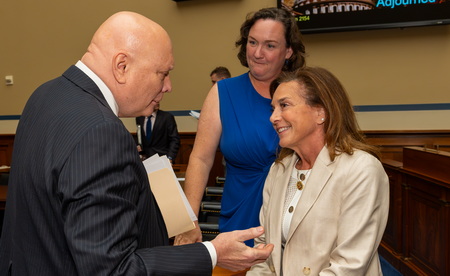
- He added, “Rent control and eviction moratoriums are on first blush appealing concepts, but they’ve proven time and again, that they’re counterproductive to addressing the housing shortfall.”
- Congress should also enact a time-limited tax incentive to convert older, underutilized commercial buildings to housing that would help revitalize America’s cities, accelerate the economic recovery of office buildings, and create new supplies of housing in close proximity to jobs.
Property Conversions
- Separately, The Roundtable provided a list of specific agency actions to accelerate property conversion projects in a recent letter to Jared Bernstein, Chair of the White House Council of Economic Advisers. (Roundtable Weekly, April 19)
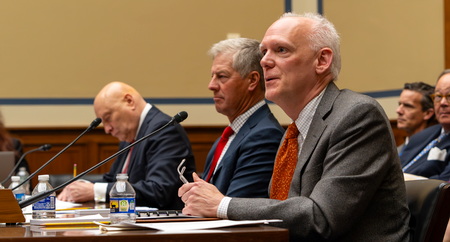
- During this week’s hearing, subcommittee witness Doug Turner, above, senior fellow for Housing at the Center for American Progress, endorsed The Roundtable’s April 15 recommendations on conversions.
- Turner stated in his written testimony and oral comments, “I want to compliment The Real Estate Roundtable for a second. They sent a letter to the Council of Economic Advisers in April and offered some very specific suggestions on how to improve the conversion process. Many of these are sensible. And they could help direct what is an evolving policy. We haven’t seen an attempt to convert this much real estate in a short period of time.” (Video clip of Turner’s full comment, or click on photo above)
The Roundtable’s all-member Annual Meeting on June 20-21 in Washington, DC will include speakers and policy advisor committee meetings focused on many of the topics discussed during this week’s House hearing.
# # #
